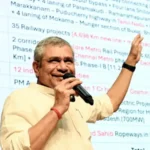
Bengaluru: Union Minister of Railways, Information & Broadcasting, and Electronics & Information Technology, Shri Ashwini Vaishnaw, inaugurated the new office of ARM, a global leader in semiconductor design, in Bengaluru on 16 September 2025. During the event, the minister announced that the most advanced 2nm chips used in AI servers, drones, and mobile phones will now be designed in India.
Shri Vaishnaw highlighted that the ARM Bengaluru unit will play a pivotal role in India’s vision to establish itself as a global hub for semiconductor design and manufacturing. “Our objective is to design and manufacture semiconductors, along with the equipment and materials required for them,” the minister said, emphasizing that Prime Minister Shri Narendra Modi’s guidance has provided a clear roadmap for the sector over the next two decades.
The minister also underscored the rapid growth of India’s electronics industry, which has increased six-fold over the past 11 years and currently stands at ₹11.5 lakh crore. Exports of electronic products have grown eight-fold, making electronics a major export sector for India. This expansion is driving a growing demand for advanced semiconductor chips.
“This journey, which began with assembling mobile phones and laptops, is now progressing to producing components, models, and finished products,” Shri Vaishnaw said. He noted that India’s semiconductor sector is steadily evolving into a trillion-dollar industry, creating significant opportunities for skilled engineers and young innovators.
Currently, 278 institutions and universities are engaged in semiconductor design and innovation, with students contributing to the creation of 28 chips that have already been taped out. The minister confirmed that India has practically completed the first phase of the Semiconductor Mission and is now moving toward its second phase, which will focus on the production of equipment and materials essential for semiconductor chip manufacturing.
Earlier in the day, Shri Vaishnaw also held discussions on producing high-precision components for semiconductor manufacturing equipment. Carborundum Universal Ltd (CUMI) showcased advanced materials used in the construction of such equipment, reflecting India’s growing capabilities in supporting the semiconductor ecosystem.
With ARM’s Bengaluru office, India is poised to strengthen its position in global semiconductor design, providing a platform for innovation, skilled employment, and strategic self-reliance in next-generation electronics.
